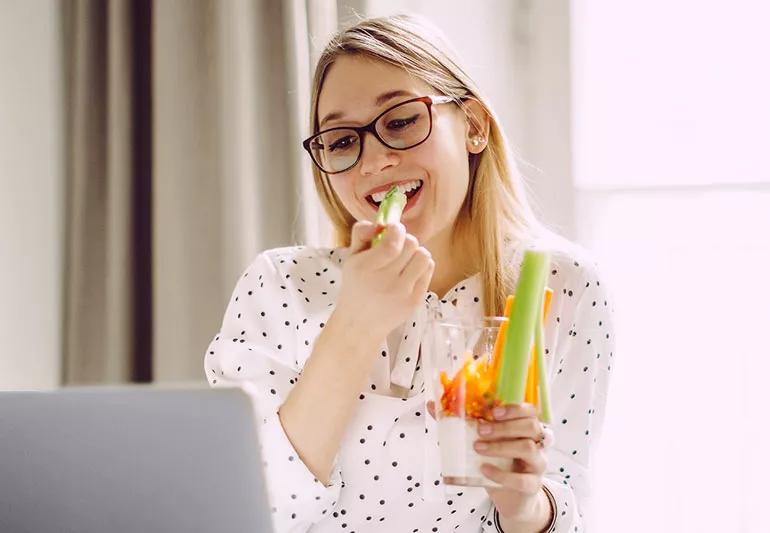Plus 10 dietitian-approved snacks

Image content: This image is available to view online.
View image online (https://assets.clevelandclinic.org/transform/371f7cb0-6540-4e36-a0a2-896e2c715776/veggieSnack-639577180-770x553_jpg)
woman snacking on veggetables and yogurt dip
It’s 3 o’clock and your stomach is rumbling. No possible way you’re making it to dinner. While it’s tempting to make a vending machine run or rummage around mindlessly in the fridge, snacking is (yet another of those) things in life where a little advanced planning pays off big.
Advertisement
Cleveland Clinic is a non-profit academic medical center. Advertising on our site helps support our mission. We do not endorse non-Cleveland Clinic products or services. Policy
To keep your weight in check, healthy food choices matter. And that includes all of the food you eat, says dietitian Mira Ilic, RD, LD. Your carefully planned diet can go astray if you’re unwise in the snacking department.
“I recommend a Mediterranean way of eating in general — for both meals and snacks,” Ilic advises.
After all, about 90% of Americans snack between meals, according to the National Health and Nutrition Examination Survey. That’s not necessarily a bad thing, as long as you follow these simple guidelines.
Choose nutrient-dense snack foods. Why? It’s because snacks that combine protein, high-fiber carbs and healthy fats are nourishing. That means they’ll keep you feeling full longer.
Protein can come from both plant and animal sources (if you eat it). And you’ll find healthy fats in avocado, olive oil, nuts, nut butter, seeds (like chia or flax) and fish.
So fruits and veggies should be a large part of what you’re snacking on, Ilic says. Unlike many snacks, they’re not just empty calories. They have nutrients and antioxidants, and some have anti-inflammatory properties. (Bonus!)
But knowing which foods to avoid is just as important as those to choose. Stay away from sugary foods, processed foods made with white flour (which are inflammatory), and foods high in sodium. Saturated fats and trans fats can also promote inflammation.
Be sure to read food labels. Yogurt itself is a fine pick. But it can be unhealthy if it contains lots of sugar. If you buy the flavored variety, find one with less than 10 grams of sugar, she suggests.
Advertisement
Well-timed snacks can help to keep you from overeating at meal time.
For example, it’s actually a good idea to get that 3 p.m. snack to tide you over from lunch until dinner.
If you run out the door in the morning with no thought to what you’ll snack on that day, there’s a good chance you’ll regret it later.
It’s too easy to grab a bag of potato chips or a sugar-laden power bar masquerading as a healthy snack when you’re ravenous. These options tend to be high in calories and loaded with added sugar, salt and bad-for-you fats.
The solution? Pack your own snacks each morning (or the night ahead) in a small container or small snack bag. Aim for about one-quarter to one-third of a cup.
Here are 10 healthy snacks ideas that Ilic recommends to get you started:
Advertisement

Sign up for our Health Essentials emails for expert guidance on nutrition, fitness, sleep, skin care and more.
Learn more about our editorial process.
Advertisement
Snacking can bring benefits with healthy food choices and planning
Stress, lack of sleep and not eating enough all contribute to sugar hankerings
Moderation is important for lowering risks
The color additive found in many pre-packaged foods may affect those with ADHD or allergies
These foods sabotage weight loss and rob you of rest
What you eat between meals matters
A convenient and nutrient-rich snack
Practical tips for curbing cravings and smart swaps
Type 2 diabetes isn’t inevitable with these dietary changes
Applying a hot or cold compress can help with pain
Pump up your iron intake with foods like tuna, tofu and turkey